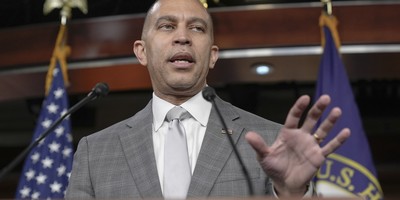This week, the Supreme Court heard oral argument in two gay marriage cases: Hollingsworth v. Perry, which will decide the fate of California’s Proposition 8; and United States v. Windsor, which will decide the fate of the Defense of Marriage Act (DOMA), signed in 1996 by President Clinton. At issue are two written authorities, a California law that resulted from a citizen initiative, and a federal statute that resulted from wide, bipartisan congressional consensus.
In ruling on those laws, the Court will rely on other written authorities: the Constitution, the 5th and 14th Amendments to the Constitution, and its own prior decisions, including Loving v. Virginia, Romer v. Evans, Lawrence v. Texas, and perhaps Sherrer v. Sherrer, in which the Court held, “Under the Constitution, the regulation and control of marital and family relationships are reserved to the States.”
None of these authorities explicitly says there is a federal right to gay marriage, or that state laws outlawing gay marriage are unconstitutional. But of course, it’s not that simple. The Court’s decisions, likely to be rendered in June, will take the form of written opinions. Those opinions cannot and will not settle the gay marriage debate because it is not amendable to final resolution via textual interpretation. Rather, it is an ongoing matter not just of law, but also of faith, experience, and emotion. A quick look at the arguments for and against reveals why.
The most common non-legal reasons offered for national legal recognition of same-sex marriage are the following: (1) I should be able to marry whomever I love; (2) my marriage doesn’t affect yours; (3) I support gay marriage because someone I know is gay; and (4) don’t impose your religious values on me; my religion supports gay marriage, or doesn’t proscribe it.
Recommended
Conversely, the most common non-legal reasons against national legal recognition of same-sex marriage are the following: (1) no one is entitled to marry whomever they choose; states have regulated marriage since the country’s inception; (2) radically redefining marriage will harm society; (3) I will not support gay marriage regardless of who in my life is or is not gay; and (4) my religious beliefs impel me to support only man-woman marriage.
Unlike the limited scope of the Supreme Court’s decision-making, which is confined to the specific authorities referenced above, these arguments rely on emotion, relationship experiences, religion and gut instincts. Thus is revealed the true divides in this debate.
The true divides are on the sources of opinions far beyond the legalities of constitutional law. In view of this, what becomes clear is that the Court is the wrong institution to be deciding this issue because it is not equipped to do so; it has no competency to adjudicate what is essentially a non-legal question, and it is too limited in its ability to consider the non-legal reasons for or against gay marriage.
We would not accept a Court opinion decided on the basis of personal or familial relationships. So the fact that Chief Justice John Roberts apparently has a lesbian family member is irrelevant to the Court’s resolution of this issue. Likewise, we would further not accept a decision that relied solely on a religious text as the final authority. If we did, these cases would be overwhelming decisions against gay marriage as the Court is majority-Catholic, and orthodox Catholic teaching forbids gay marriage. Yet those are some of the most common bases for public opinion on this matter. The Court won’t, and can’t, even consider them.
In light of this, the enduring wisdom of the Framers’ federalist vision, embodied in the 10th Amendment, is made manifest on the gay marriage issue. Matters of personal relationships like marriage, which are defined through the lenses of faith, experience and emotion, are better addressed on the state level, where all of those factors can be considered and incorporated into the debate via the democratic process. Different voices can be heard and the people can vote to have their laws reflect their values. Hence, if California wants gay marriage, it should have it – democratically. Conversely, if North Carolina doesn’t want gay marriage, it should outlaw it – democratically.
This is the proper result for the Proposition 8 case. Relying on the Court to dictate to fifty sovereign states what can and should be a state-by-state marriage definition simply turns the constitutional order inside out, and leaves advocates on both sides of the issue feeling ignored. There is a better way. Similarly, while presenting slightly different constitutional questions, DOMA can also be resolved democratically. If Americans think DOMA was wrong, Congress can and should repeal it.
As a nation, we have seen the results of Supreme Court overreach. The lesson is clear: unless the Court holds that marriage is fundamentally a state issue, subject to the democratic voice of the people within the states, the Court will repeat the error of Roe v. Wade. By dictating a result lacking any constitutional basis, which the country was not ready for, and which deprived the people of their right of self-government, the Court instigated forty years of needless rancor. Surely those on both sides of the gay marriage issue can agree that such a result is undesired here.

























Join the conversation as a VIP Member